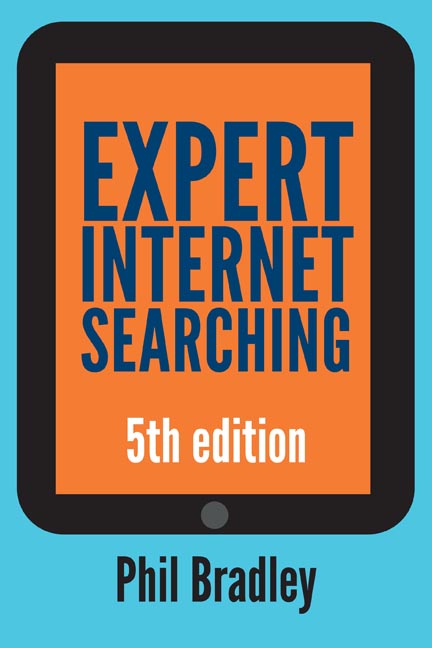Book contents
- Frontmatter
- Contents
- List of figures
- Preface
- Acknowledgements
- 1 An introduction to the internet
- 2 An introduction to search engines
- 3 The world according to Google
- 4 Other free-text search engines
- 5 Directory, clustering and similarity search engines
- 6 Multi- and meta-search engines
- 7 Social media search engines
- 8 Visual and image search engines
- 9 People-based resources
- 10 News-based search engines
- 11 Multimedia search engines
- 12 Specialised search engines
- 13 Hints, tips and the future
- Index
- Frontmatter
- Contents
- List of figures
- Preface
- Acknowledgements
- 1 An introduction to the internet
- 2 An introduction to search engines
- 3 The world according to Google
- 4 Other free-text search engines
- 5 Directory, clustering and similarity search engines
- 6 Multi- and meta-search engines
- 7 Social media search engines
- 8 Visual and image search engines
- 9 People-based resources
- 10 News-based search engines
- 11 Multimedia search engines
- 12 Specialised search engines
- 13 Hints, tips and the future
- Index
Summary
Welcome to this, the fifth edition of Expert Internet Searching, which began its life back at the beginning of the century, when it was called The Advanced Internet Searcher's Handbook. That very first edition, published towards the end of 1999, didn't even mention Google. Most of the search engines that I wrote about no longer exist and over the years functionality has waxed and waned.
We're now in a world of user-generated content, access to data not just at the touch of a button but by simply asking the question into our living rooms where our mobile assistants can research and answer the question as soon as we have finished speaking it. ‘News’ now means things that happened in the last few seconds, instead of the last few hours or the last day or week, and we've seen the rise of ‘fake news’. While we have such easy access to information, and everyone can contribute to it, the other side of that coin is that everyone does it, only not for the greater good, but to promote their own political or religious agenda, and in doing so accuracy and truth become immediate casualties.
We all still see the rather silly claim that ‘it's all on Google, so why do we need libraries and librarians?’ but I firmly believe that information professionals are needed now more than ever. It's in part our role to help stem the tide of fake news, to open people's eyes to the rich abundance of information available in so many different formats, and to assist them in working out what they need to know and the best way of getting it. When I was a child and I told my careers officer that I wanted to be a librarian she said ‘is it because you like books?’ and I said ‘No, it's because I want the power’. It's even more true today than it was rather too many decades ago. The more information that we have at our fingertips, the more useful and powerful we become. However, we don't get that by simply visiting Google at every opportunity.
Information
- Type
- Chapter
- Information
- Expert Internet Searching , pp. xi - xiiPublisher: FacetPrint publication year: 2017
